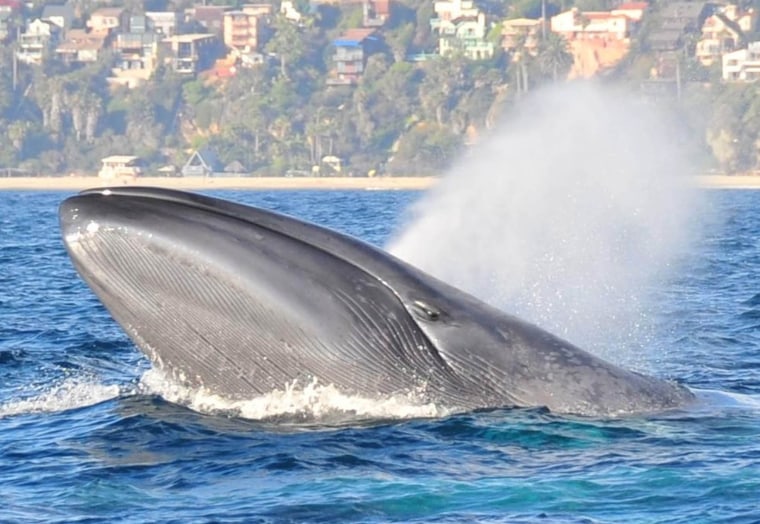Blue whales' songs are hauntingly deep, filled with extraterrestrial vibratos, and utterly mysterious. Despite many attempts to interpret them, scientists still don't know what the world's largest animals are saying.
Now, the mystery only thickens. For decades, blue whales have been singing with increasingly deeper voices, reports a new study. In some cases, the pitch of their songs has dropped by more than 30 percent. Frustrated researchers cannot yet explain why.
"It's a worldwide phenomenon," said Mark McDonald, an ocean acoustician and independent researcher in Bellvue, Colo. "All blue whales are shifting their frequencies downward. They are all going in the same direction, and we really don't understand it."
"Maybe by putting this data out there," he added, "someone will have a eureka moment and see something that really explains this."
McDonald first suspected something was going on about eight years ago, when he started setting up underwater detectors to study blue whales across the Pacific Ocean.
To get the devices to work, he and colleagues noticed that they had to shift the detector frequencies downward every year. At the time, they didn't know if something was amiss with the detectors or with the whales.
For the new study, McDonald and colleagues collected acoustical data on blue whales from as far back the 1950s. Some recordings came from underwater microphones put in place by whale researchers or the military. More recently, researchers have developed new technologies to monitor whale sounds over large distances and time-spans.
McDonald's group was able to collect data from multiple points in time for seven of the 10 known types of blue whale songs.
Each song type, researchers believe, belongs to a different population of whales. Within a population, individuals match frequencies with each other.
For all seven of the groups, the scientists reported in the journal Endangered Species Research, the pitch of the animals' voices has dropped over the years, with some groups falling more than others. In the most extreme example, blue whales off the coast of California are now singing with voices that are 31 percent deeper than they were in 1964.
One of the first theories colleagues propose when they heard about the findings, McDonald said, is that the vocal tracts of blue whales might be bigger now than they used to be.
After all, the theory goes, whales have increased in number and probably in size since commercial whaling was banned in the 1960s. Bigger whales should have bigger vocal chords that produce deeper voices.
The problem with that hypothesis, McDonald said, is that blue whales are mostly fully grown by age 8, even though they live for many decades. When it comes to body size, populations should have recovered long ago. Yet, their voices keep deepening.
"All sorts of people say that this is the obvious answer," McDonald said. "But when you try to put the numbers to it, that one doesn't pan out."
The numbers also ruled out climate change, ocean acidification and a rise in ocean noise from ships, among other theories.
Instead, McDonald's current favorite hypothesis is that, because their numbers have increased, blue whales are more likely to be close to other whales. That means their calls don't have to be as loud in order to be heard. In turn, they can sing in lower frequencies, which don't travel as far through water as higher ones do.
It takes more energy to sing deeply, though. To explain why they're making that extra effort, the researchers propose that deeper voices are sexier — even for whales — and could be used to attract potential mates. Only the males sing.
There's also a possibility that cultural change is driving whale voices deeper in the same way that our languages change over time, McDonald said — an intriguing idea that is, for now, pure speculation.
The fact that scientists haven't yet solved this mystery suggests that there may not actually be a solution that makes sense, said research biologist John Calambokidis, of Cascadia Research, a research organization in Olympia, Wash., that focuses on threatened marine mammals.
"You can't always expect animals will respond in a way that is logical," he said. "A new thing like ocean noise might make them respond in ways that are not necessarily adaptive."
The study is yet another reminder of how little we actually know about blue whales.
"There are still so many mysteries about these animals," Calambokidis said. "New methods like acoustics research have opened up new insights. They've also raised new mysteries, and this is one of them."
